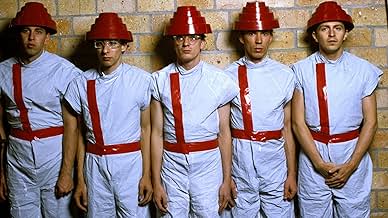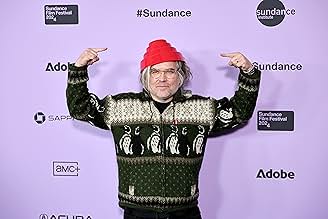En 1980, la banda de new wave Devo logró un éxito con "Whip It" y alcanzó reconocimiento popular con su mensaje de "des-evolución" social, formado en respuesta a los tiroteos de Kent State d... Leer todoEn 1980, la banda de new wave Devo logró un éxito con "Whip It" y alcanzó reconocimiento popular con su mensaje de "des-evolución" social, formado en respuesta a los tiroteos de Kent State de 1970.En 1980, la banda de new wave Devo logró un éxito con "Whip It" y alcanzó reconocimiento popular con su mensaje de "des-evolución" social, formado en respuesta a los tiroteos de Kent State de 1970.
- Premios
- 1 premio ganado y 1 nominación en total
- Self - Devo
- (as Jerry Casale)
- Self - Devo
- (as Bob Mothersbaugh)
- Self - Devo
- (material de archivo)
- (voz)
- Self - Devo
- (material de archivo)
- Self - Devo
- (material de archivo)
- (voz)
- Self - Devo's Manager
- (material de archivo)
- Self - 35th President of the United States
- (material de archivo)
- Self - 37th President of the United States
- (material de archivo)
- Self - 39th President of the United States
- (material de archivo)
- Self - 40th President of the United States
- (material de archivo)
- Self - Killed at Kent State Anti-War Protest
- (material de archivo)
- Self - Killed at Kent State Anti-War Protest
- (material de archivo)
- Self - Early Collaborator
- (material de archivo)
- (voz)
- Self - Christian Evangelist
- (material de archivo)
- Self - Singer-Songwriter
- (material de archivo)
- Self - Entrepreneur
- (material de archivo)
Opiniones destacadas
Chris Smith creator of "American Movie" creates a fun documentary about the band DEVO who are widely misunderstood with interesting choices of music, background observations and conversations. DEVO's background and story is pretty interesting as the documentary does a good job on exploring the band with some fun insights.
Since I am not the biggest music documentary person, I found certain aspects feeling slow and uneventful towards the second act. Including some of the conversations feeling a little dry. Overall, there are some really nice fun moments together.
I was unaware they were actually highly intelligent people trying to give a message politically to us all!!
So many people who were influenced by them and inspired by their music being it controversial mongoloid etc. Didn't know David Bowie had anything to do with them either.
I thought so many of their songs were great and real catchy and still get a buzz out of hearing them. Also now know why MTV do not play their music (didn't in the 80's) and haven't seen them since so that goes to show Sadly 2 of the four have died at a fairly youngish age but the 2 telling the story are fascinating to listen you.
Yes, mindless consumerism and toxic capitalism is bad, but the same society they lampoon has awarded them a career. They know this (the doc nods to it in the second half) and while they're by no means the most shameless paradox in music (looking at you, Rage Against The Machine), you still can't help but cringe at the bigger picture unfolding in front of you with this film: privileged Me Generation ultimately changed nothing with their complaining and became the system they hated at varying degrees.
Especially when, during one particular archived interview, the members basically concede their pleasure in profiting from their fans and justifying it by audience numbers... the same logic used by their corporate and government peers.
Another flaw: the lack of insight to their core musicality. Mostly the film likes to cover social and thematic aspects of Devo, but almost no insight is offered about their actual music, the equipment, the historical place they have during post-punk and onward.
Devo's place in pop culture shouldn't be undercut but it also shouldn't be overstated. Ethos aside, in the greater story of music, they are still mostly that one-hit wonder band that made "Whip It". This doc tries to walk the middle-ground but can't totally get away with what it's trying to do, and frankly it's on the fringes of a puff piece.
Before they were even a band, Devo was an intellectual art project forged by twin events for the Ohio based artists. First, they were influenced by the outre theory of De-Evolution which included a pamphlet entitled "Jocko Homo" (credit much also go to Bob Lewis who was an early collaborator). Second, key members Jerry Casale and Mark Mothersbaugh were on campus and witnesses to the Kent State massacre in 1970. Add in a pinch of the classic horror film ISLAND OF LOST SOULS and what became Devo was born.
It took a few years, but Devo got seen and heard through their innovative short films which predated MTV and the music video revolution (which they became key contributors to). They made their way to NYC and got truly 'discovered' and noticed by the likes of John Lennon, Iggy Pop and Bowie (who eventually shephereded their first album in 1978 via Brian Eno). Even Mick Jagger got into the act as he personally signed off on Devo's first official single, a cover of "(Can't Get No) Satisfaction". Soon SNL called.
Smith's doc covers all of this in great detail and it makes up more than half of the running time. It's quite clear early on that Devo was never going to much more than a cult act. Their hit single "Whip It" also became a bit of an albatross as the record label kept demanding another hit (it was to be Devo's sole Top 40 record). Devo kept plugging away, touring, shooting videos, recording - rinse, repeat eventually putting out 8 albums during their initial incarnation.
In reality, by 1984 they had been somewhat abandoned by all but their most loyal fans and were dropped by their record label. Members began to quit (and sometimes come back), It may sound like a typical 'Behind The Music' career arc, but what what set the band apart was they never were really in it for the fame and fortune. They had a theory of man's de-evolutionary downward spiral and they preached and practiced it.
Devo may never get into the Rock Hall Of Fame although they've been nominated multiple times, but their experimental excellence endures. DEVO is a fine film tribute.
¿Sabías que…?
- TriviaDevo (via Mark Mothersbaugh) earns approximately $1 million annually from "Uncontrollable Urge," thanks to its long-standing role as the theme for MTV's "Ridiculousness."
- Citas
Mark Mothersbaugh: And after the set was over, Bowie came backstage, and he said he'd like to produce us. We're like, "Sounds good to us, because we're sleeping in an Econoline van tonight."
- ConexionesFeatures Island of Lost Souls (1932)
- Bandas sonoras(I Can't Get No) Satisfaction
Performed by Devo
Selecciones populares
Detalles
- Tiempo de ejecución
- 1h 34min(94 min)
- Color








































